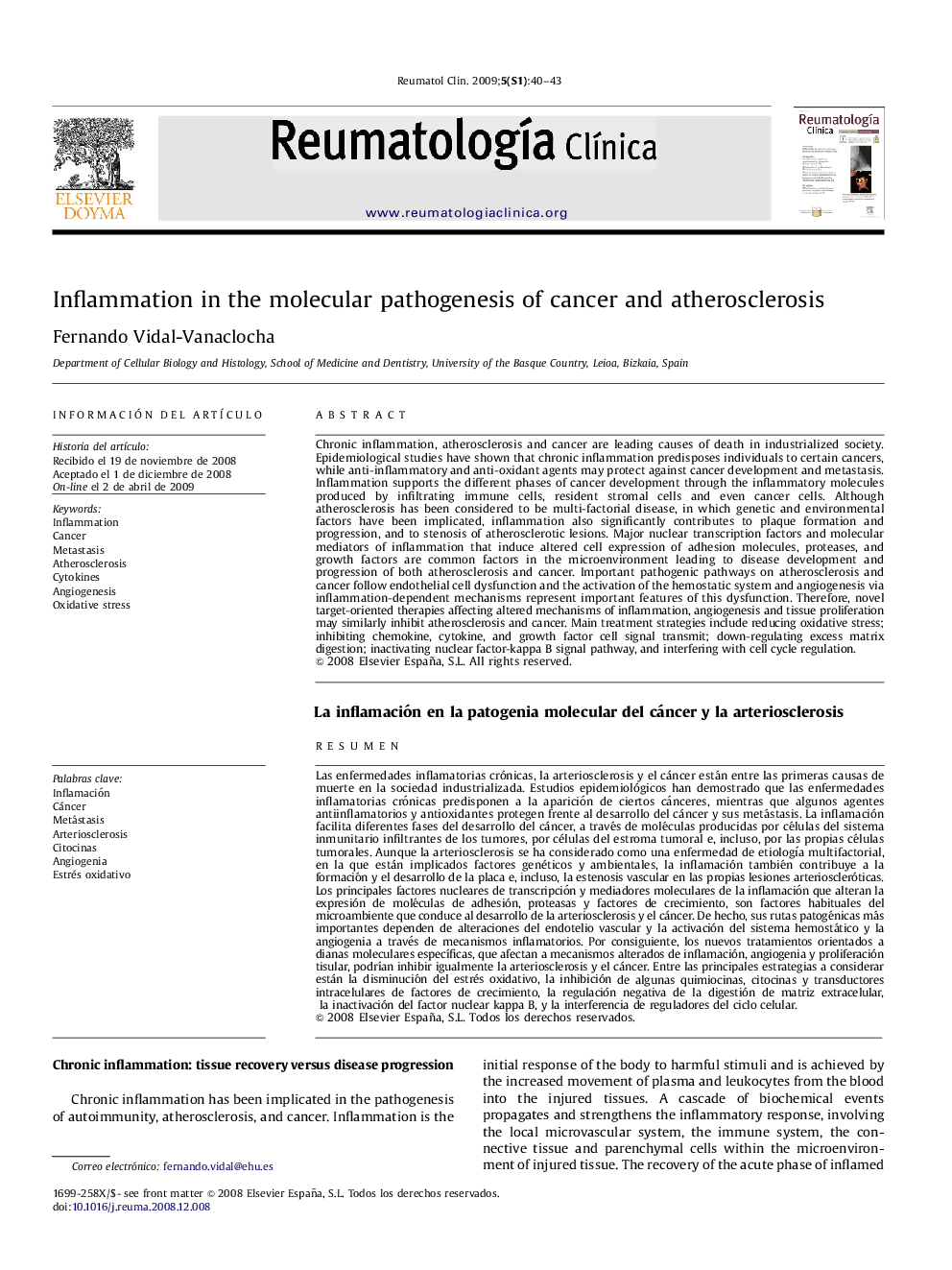| کد مقاله | کد نشریه | سال انتشار | مقاله انگلیسی | نسخه تمام متن |
|---|---|---|---|---|
| 3383419 | 1220457 | 2009 | 4 صفحه PDF | دانلود رایگان |

Chronic inflammation, atherosclerosis and cancer are leading causes of death in industrialized society. Epidemiological studies have shown that chronic inflammation predisposes individuals to certain cancers, while anti-inflammatory and anti-oxidant agents may protect against cancer development and metastasis. Inflammation supports the different phases of cancer development through the inflammatory molecules produced by infiltrating immune cells, resident stromal cells and even cancer cells. Although atherosclerosis has been considered to be multi-factorial disease, in which genetic and environmental factors have been implicated, inflammation also significantly contributes to plaque formation and progression, and to stenosis of atherosclerotic lesions. Major nuclear transcription factors and molecular mediators of inflammation that induce altered cell expression of adhesion molecules, proteases, and growth factors are common factors in the microenvironment leading to disease development and progression of both atherosclerosis and cancer. Important pathogenic pathways on atherosclerosis and cancer follow endothelial cell dysfunction and the activation of the hemostatic system and angiogenesis via inflammation-dependent mechanisms represent important features of this dysfunction. Therefore, novel target-oriented therapies affecting altered mechanisms of inflammation, angiogenesis and tissue proliferation may similarly inhibit atherosclerosis and cancer. Main treatment strategies include reducing oxidative stress; inhibiting chemokine, cytokine, and growth factor cell signal transmit; down-regulating excess matrix digestion; inactivating nuclear factor-kappa B signal pathway, and interfering with cell cycle regulation.
ResumenLas enfermedades inflamatorias crónicas, la arteriosclerosis y el cáncer están entre las primeras causas de muerte en la sociedad industrializada. Estudios epidemiológicos han demostrado que las enfermedades inflamatorias crónicas predisponen a la aparición de ciertos cánceres, mientras que algunos agentes antiinflamatorios y antioxidantes protegen frente al desarrollo del cáncer y sus metástasis. La inflamación facilita diferentes fases del desarrollo del cáncer, a través de moléculas producidas por células del sistema inmunitario infiltrantes de los tumores, por células del estroma tumoral e, incluso, por las propias células tumorales. Aunque la arteriosclerosis se ha considerado como una enfermedad de etiología multifactorial, en la que están implicados factores genéticos y ambientales, la inflamación también contribuye a la formación y el desarrollo de la placa e, incluso, la estenosis vascular en las propias lesiones arterioscleróticas. Los principales factores nucleares de transcripción y mediadores moleculares de la inflamación que alteran la expresión de moléculas de adhesión, proteasas y factores de crecimiento, son factores habituales del microambiente que conduce al desarrollo de la arteriosclerosis y el cáncer. De hecho, sus rutas patogénicas más importantes dependen de alteraciones del endotelio vascular y la activación del sistema hemostático y la angiogenia a través de mecanismos inflamatorios. Por consiguiente, los nuevos tratamientos orientados a dianas moleculares específicas, que afectan a mecanismos alterados de inflamación, angiogenia y proliferación tisular, podrían inhibir igualmente la arteriosclerosis y el cáncer. Entre las principales estrategias a considerar están la disminución del estrés oxidativo, la inhibición de algunas quimiocinas, citocinas y transductores intracelulares de factores de crecimiento, la regulación negativa de la digestión de matriz extracelular, la inactivación del factor nuclear kappa B, y la interferencia de reguladores del ciclo celular.
Journal: Reumatología Clínica - Volume 5, Supplement 1, April 2009, Pages 40–43